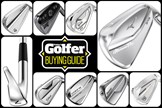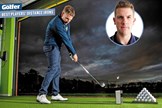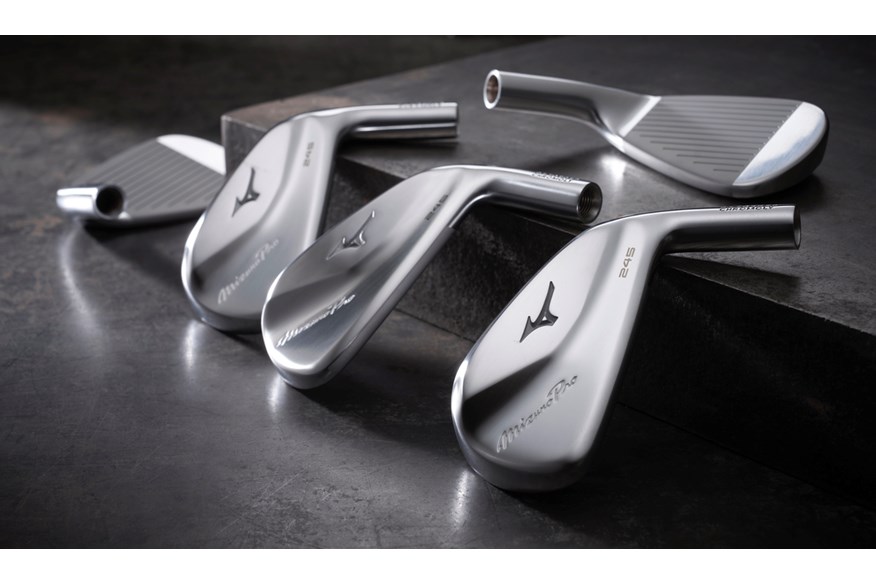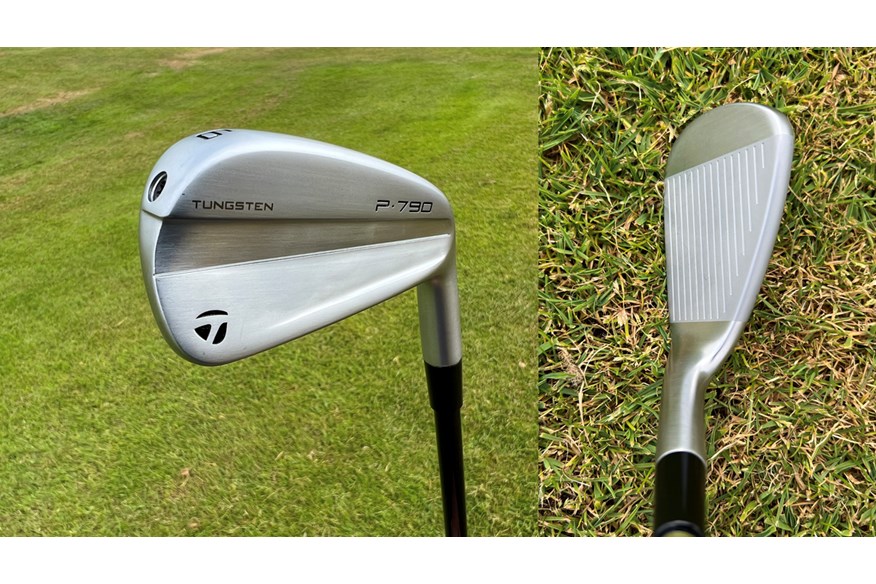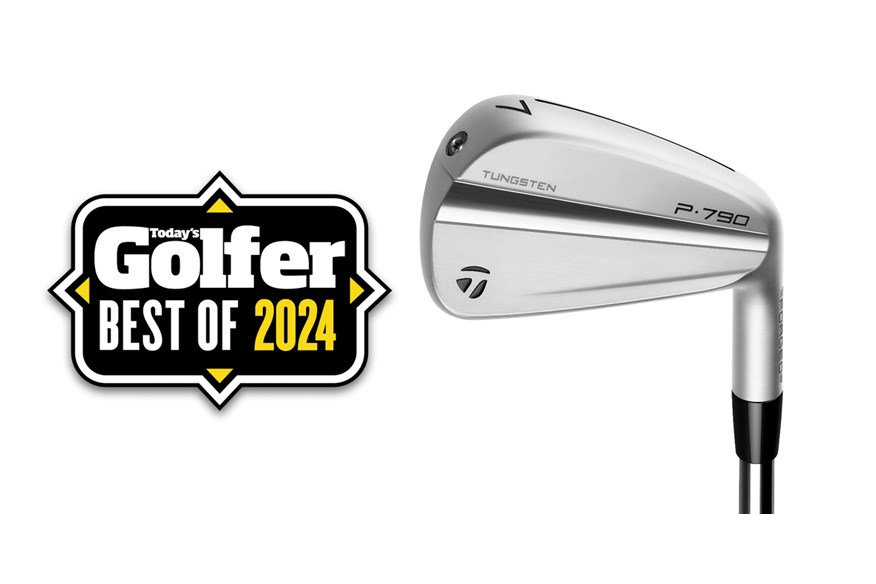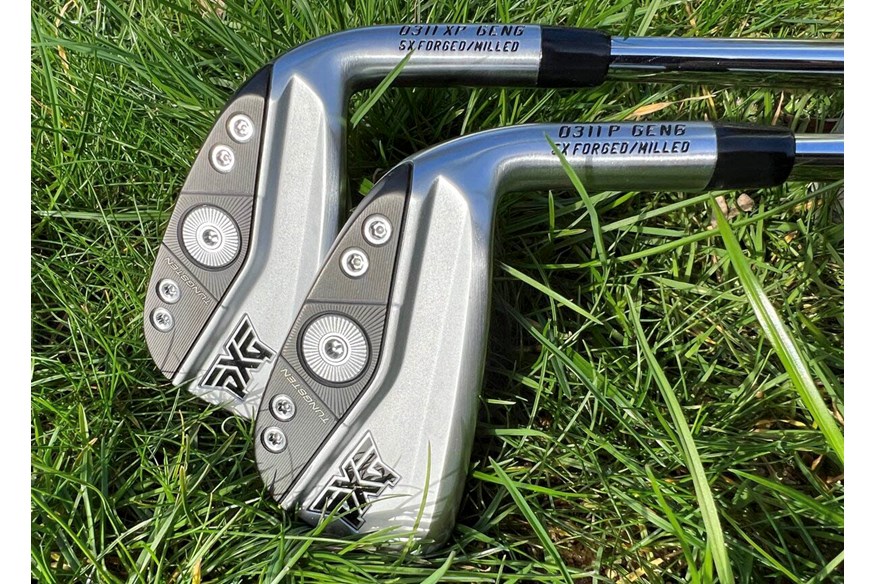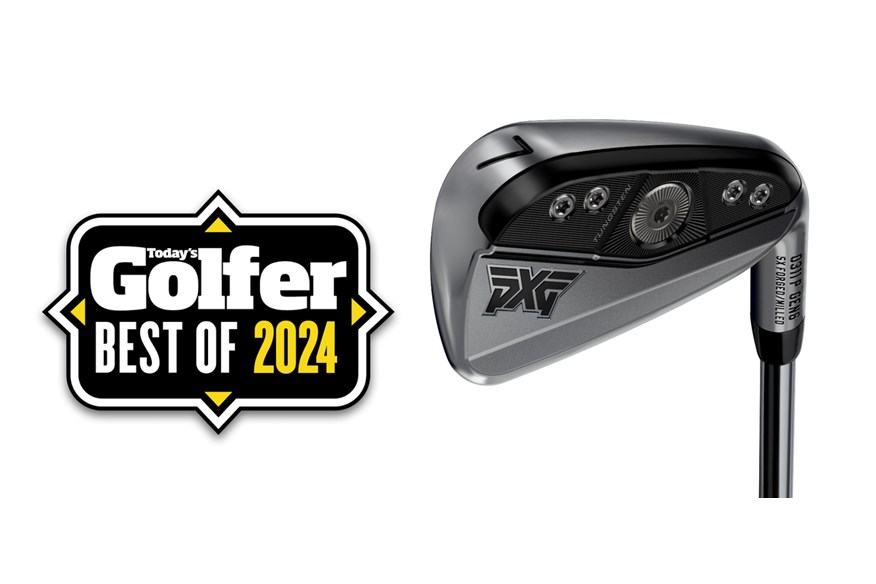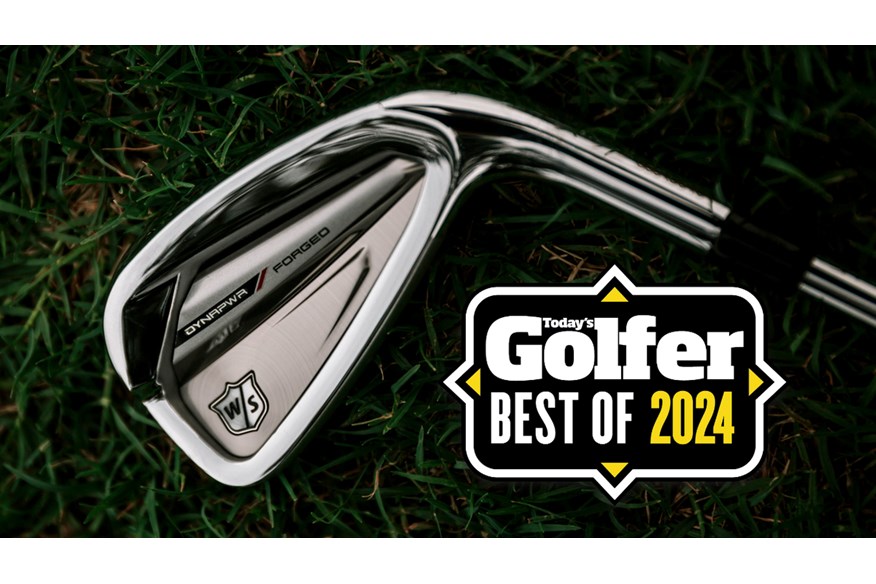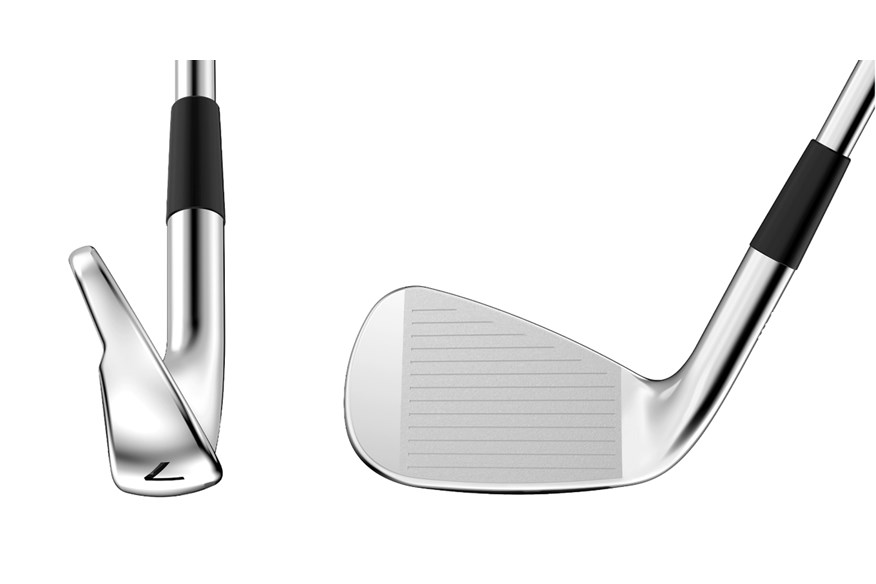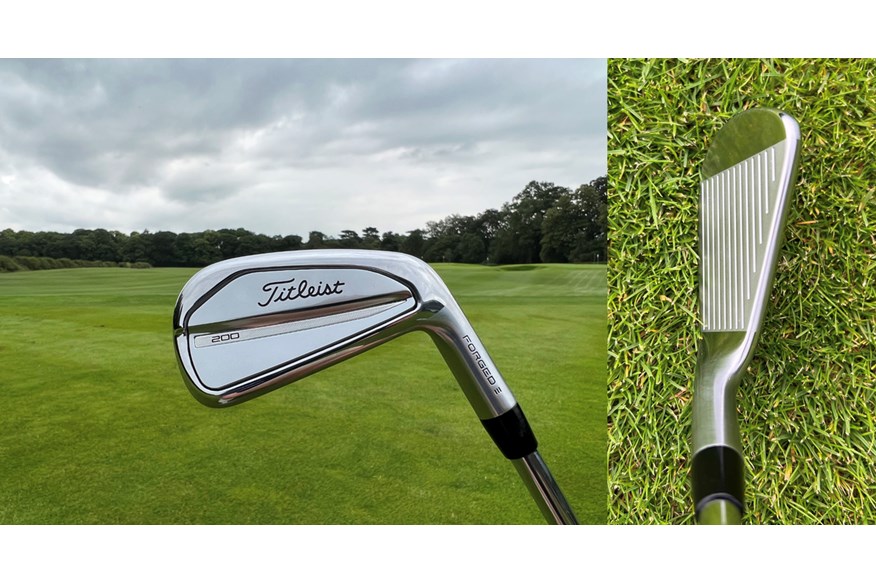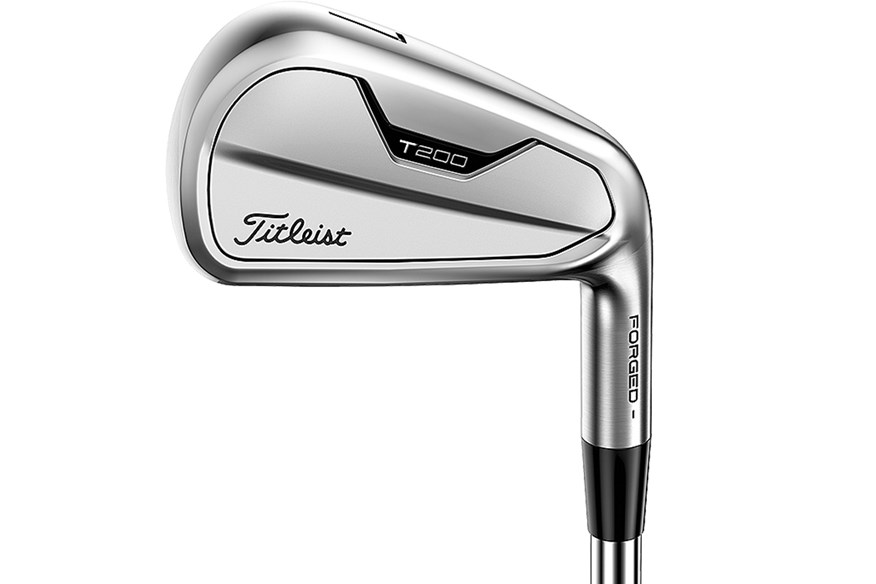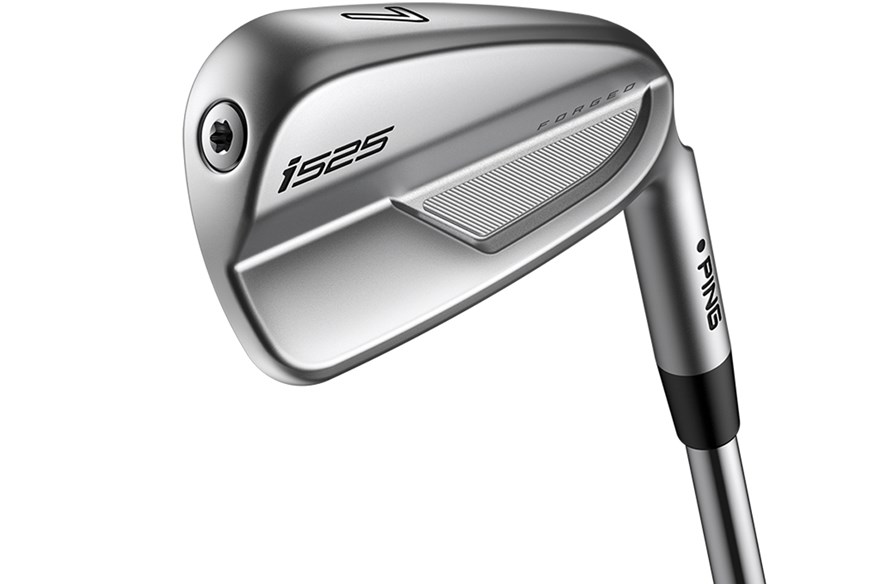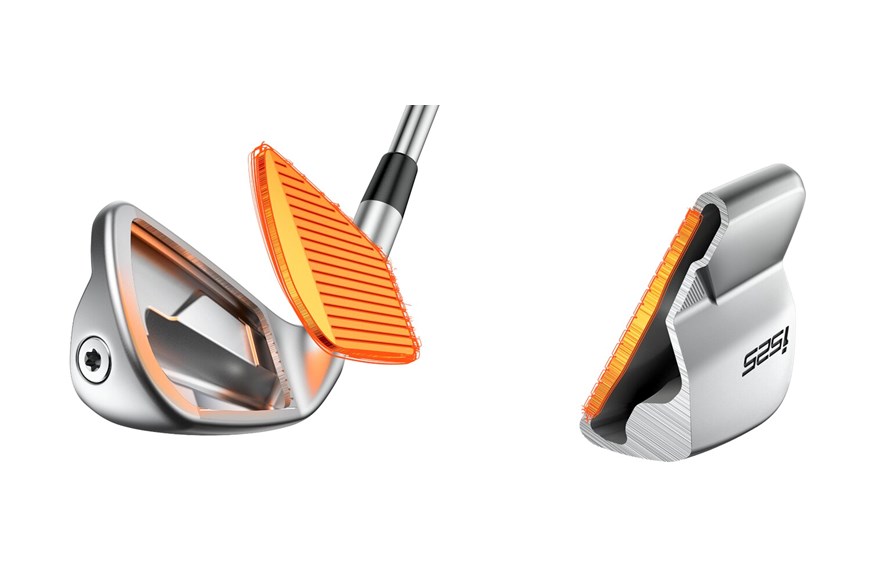Best Players’ Distance Irons 2025: The data-backed power machines for lower handicaps
Last updated:
Our test team puts 2025’s leading models through their paces to find out which players’ distance irons top the yardage charts.
The best players’ distance irons pack a lot of technology into a head shape that still looks desirable whilst typically generating more ball speed and distance than blade irons or pure players’ irons. If you’re not sure what type of iron you should be playing, check our comprehensive guide to the best golf irons.
The TaylorMade P790 is one of the most well-known examples of a players’ distance iron, with a hollow head that looks almost like a blade but packs a huge amount of power. Players’ distance irons don’t tend to spin as much as pure blades, but the high launch they generate helps shots hold greens.
Best At A Glance:
Best overall players distance iron: TaylorMade P790 Irons | Buy Now
Best for descent angle: Mizuno Pro 245 Irons | Buy Now
Best for playability: PXG 0311 P GEN6 Irons | Buy Now
Best looking players’ distance iron: Srixon ZX5 MKII Irons | Buy Now
Best traditional players’ distance iron: Wilson Dynapower Forged Irons | Buy Now
Who are players’ distance irons for?
From our experience, many players who use blades or players’ irons would actually be better suited to players’ distance irons. They’re certainly not a wonder drug for all golfers, but if you’re anything from a 12-handicapper to a low single-figure player then they’re well worth your attention.
In many instances, the clubhead size in the players’ distance category will be a little larger to inspire more confidence at address. The toplines are reasonably thin and shaft weights tend to be a little lighter than those found in blades. The rapid growth of the players’ distance iron category can not only be attributed to aspirational aesthetics but faster ball speeds and more distance than traditional players’ irons.
Best Players’ Distance Irons 2025:
A punchy players' distance irons that will fight it out with the best.
His thinking came down to loving the punchy feel of the Pro, and how its slightly weaker 7-iron loft gave him the hanging rather than boring ball flight he prefers. Our test data utterly supports what his eyes and gut feel were telling him. Unless you specifically want to lower ball flight with the JPX923 Hot Metal Pro, the 245 launched and flew higher (1.5° and 1 yard respectively) span 600 RPM more, and hit the green at a 1.8° steeper descent angle, all numbers that will help golfers score better on the golf course. Ok, the JPX was 13 yards longer (with a 7-iron) but its dispersion/shot area was also 63.4% bigger which is a huge price to pay in the area of the bag most golfers crave accuracy.
Tons of golfers will be weighing up a choice between the Pro 245 and other leading hollow body irons like the TaylorMade P790, Titleist T200, Ping i525, and PXG 0311 P GEN6 this year. My advice to anyone trying to fathom this conundrum is to go and try them side by side. Very quickly you’ll narrow your choice to a couple of favorite options based on head shape, feel, and ball flight traits.
From there be led by your ability to customize. All in, you can’t make a bad choice, these are great irons, hence why they all feature on my shortlist of top-performing Players’ Distance Irons of 2024.
Read our full Mizuno Pro 245 irons review.
Pros
- Expect beautifully shaped heads.
- Guaranteed great feel and feedback.
- Lots of shaft options at zero upcharge.
Cons
- All the Mizuno Pro irons are seriously costly options in 2024.
| Availability | 3-PW |
| Stock shaft | Dynamic Gold Mid 100 |
| 7-iron loft | 30° |
Players’ Distance Irons just don’t come any better.
There’s a real beauty in how the model from day one has been designed to be a timeless classic. The idea means there aren’t huge changes from generation to generation and if you happen to own a set of the original 2017 P790s they’re just as good today as what they were when golfers went nuts for the marquee seven years ago.
The untrained eye will likely look at our data charts and wonder why thanks to being in a ‘distance category’ the P790 which posted almost bang-on average carry warrants such praise. Let me explain. At 30.5° in the 7-iron the P790 is nowhere near the strongest loft players distance iron we tested this year, in fact, it’s 2° weaker than the Mizuno JPX923 Hot Metal Pro that also produced the fastest ball speed and longest carry distance. But look more closely and you’ll see how the P790 produced a ball speed above our test average while flying shots higher, spinning more and hitting the green at a steeper angle so shots will stop when they hit the dancefloor.
When we put the P790's aesthetics, feel, and sound into the mix along with a tied 2nd performance for carry distance drop-off and a shot area 45.4% tighter than our test average (2nd best) you really can’t question this model's credentials. Players’ Distance Irons just don’t come any better.
Read our full TaylorMade P790 irons review.
Pros
- Having the option of trying stronger and weaker lofts during a fitting is genius thinking.
- The players' distance iron that has more proven pedigree than all of its competitors.
- A slightly lighter regular flex shaft opens the model up to more average swing speed players.
Cons
- A truly difficult iron to fault.
A super-playable iron within the players' distance category.
The 0311 iron family has won a stack of awards previously here at TG and the most recent GEN6 P is just about the best the company has to offer in the hollow body iron arena. Nobody I’ve ever spoken to doesn’t like the look or shape of PXG irons, it’s something designer/engineer Mike Nicolette has worked on tirelessly and absolutely nailed from day one. That profile shape is very slightly longer than some (which helps forgiveness), there’s a lovely crisp toe shape and beautifully clean blend into the hosel, which means the P is open to being used by quite a wide audience of players.
In terms of performance, the P stuck stubbornly on our test averages for launch angle, backspin, shot height, and descent angle, but was faster, longer and produced a tighter carry distance drop-off and shot area. To me that says the model will be super playable out on the golf course versus some of the other models in this category.
The Players’ Distance Iron arena is incredibly crowded, there are lots of good options here. I’d choose PXG not only for the cracking sound and feel of their P offering, which is made possible thanks to the brand's dedication to filling their models with lightweight polymer but also because the company has developed a second-to-none fitting system that allows golfers to go lighter, heavier, longer or shorter in their irons without the need to move the center of gravity. Yes, you’ll need a fitting to access this type of set-up but in my book, that’s time very well invested in helping get more from your iron play this year.
Read our full PXG 0311 GEN6 P irons review.
Pros
- We love how golfers can go lighter or heavier in weight and longer or shorter in shaft length without moving the center of gravity location.
- The 0311 GEN6 P and XP are some of the best looking, feeling, and sounding players' distance and mid-handicap irons available.
- PXG fitting experiences are second to none.
Cons
- Keep an eye on PXG's website, prices are prone to fluctuate and fall on a regular basis.
| Availability | 3-PW |
| Stock shafts | True Temper Elevate Tour and Elevate MP 95g, KBS Tour Lite, Nippon Modus Pro 125 |
| 7-iron loft | 30° |
A timeless classic that will still appeal to high-level players in its second year.
Best looking players' distance iron
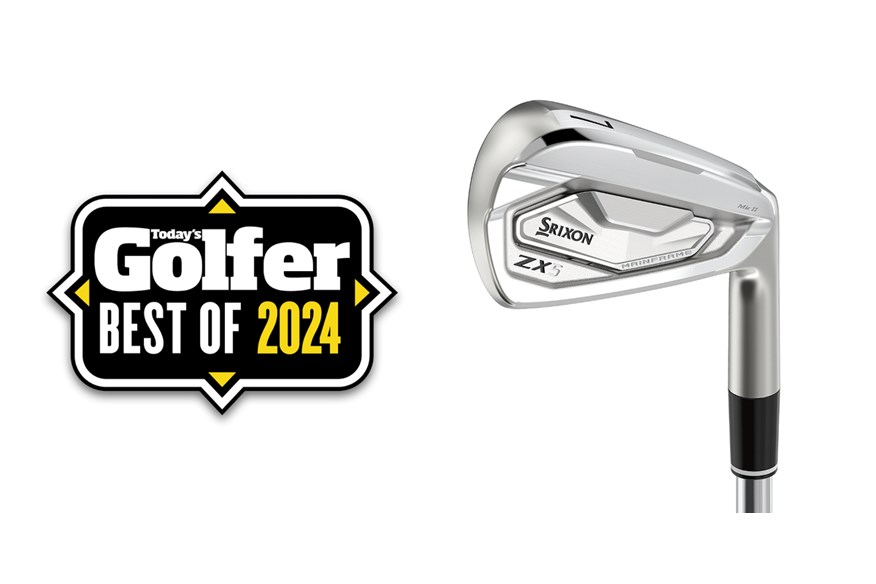

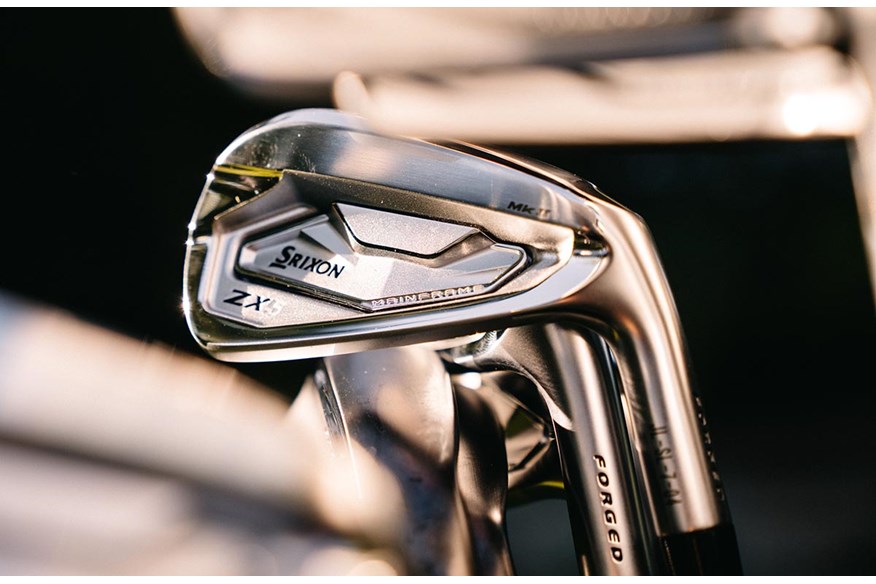
On paper as solid as the model was, there’s no hiding it produced a fraction less spin than our test average. Now that need not be a major issue, so long as you have reasonable levels of speed as this is one of the weakest lofted models in the distance category.
Our data spells out how shots launched and flew a little higher and hit the green at a steeper angle than average so it’s not like shots cannon off the springy face like low-spin bullets. Not too many irons are award winners here at TG in their second year but I love the ZX’s combination of forged head with a thin, fast, and springy face for excellent speed and distance.
The model is a great marriage, creating one of the very best timeless classic players’ distance irons available, so golfers don’t need to worry about the model feeling out of date next season. The ability to buy individual irons and combo any of Srixon’s three ZX models together still makes the ZX a brilliant buy in 2025.
Read our full Srixon ZX5 MKII irons review.
Pros
- Classic, understated, and timeless looks.
- Available to mix and match with any of Srixon's ZX models.
- Still winning awards in its second year of play.
Cons
- Lower spinning than our test average.
| Availability | 3-PW |
| Stock shafts | KBS Tour Lite (s) UST Recoil Dart (g) |
| 7-iron loft | 31° |
A traditional player's distance iron in every sense.
What Wilson very cleverly does though is build some ball speed and distance tech into this forged beauty, they also deck it out in a traditional shiny, highly polished finish that gives a timeless classic appearance. Some golfers will say the finish glares in very bright sunlight but there’s no getting away from the Dynapower Forged blending tech and tradition seamlessly into a single desirable model.
I can’t say the Forged was the fastest or longest in the category, but that doesn’t stop it from offering itself up as a very attractive Players’ Distance package in 2024. Based on the data, I see the Dynapower being a great option for slightly better golfers than those who might be attracted to a TaylorMade P790 or PXG 0311 P. My thinking is the head is pretty compact, and our test pro didn’t feel there was quite as much forgiveness or ball speed protection on offer as a hollow body alternative. Our data also highlights a slightly lower, less hanging ball flight which tends to be desirable for more serious golfers than those just wanting to look the part of a low double-digit handicapper with a great set of irons in their bag.
Costs have sky-rocketed over recent years and where £900 for a set of Wilson irons would have been inconceivable just five years ago, today versus the £1200 plus prices of many of the competition this is a really good solid players’ distance iron option in 2025.
Read our full Wilson Dynapower Forged irons review.
Pros
- Competitively priced in the current market.
- Every bit as good as the top-performing players' distance irons on the market.
- The KBS Tour Lite shaft is of decent quality.
Cons
- The traditional polished chrome finish is just a little old hat and prone to glaring in bright sunlight.
| Availability | 5-PW, GW (with custom order 3 and 4 iron) |
| Stock shafts | KBS Tour Lite (s) UST Recoil Dart 75 (g) |
| 7-iron loft | 30.5° |
Beautifully proportioned and perfectly playable for confident ball strikers.
If sound doesn’t bother you this phenomenon is absolutely nothing to worry about. The T200s are beautifully proportioned and thanks to their very reasonable lofts I see them as a model that’s playable for reasonably consistent and confident ball strikers, even at slightly more average speeds. When I was fitted for the T-Series in 2023 thanks to the slightly extra loft giving a better ball flight and spin numbers I had the option to play the model, even though I eventually chose the T350 for the reassurance of the bigger heads upping forgiveness.
If you’re drawn to the T200 I’d thoroughly recommend getting fitted through Titleist, from my experience the company has tons of fitting appointments around the country, and their fitters come armed with tons of options and product knowledge. My advice though would be to try and hit a TaylorMade P790 beforehand just to see if you can hear/feel the difference between the filled and unfilled hollow bodies.
Read our full Titleist T200 irons review.
Pros
- Very good looking in the play position.
- Hit all four heads during a fitting to see how ball flight changes, which will help you decide which best maximizes your scoring potential.
- There's an iron within the family for pretty much every golfer on the planet.
Cons
- You may need to give up a little ball speed or carry distance to reap the benefits of better distance control, dispersion, and a steeper descent angle.
| Availability | 3-PW |
| Stock shaft | True Temper AMT Black (Mid Launch, Mid Spin steel) or Mitsubishi Tensei Blue AM2 (Mid Launch, Mid Spin graphite) |
| 7-iron loft | 30.5° |
Highly playable with the feel of a proper players' iron.
Even though the model is soon to disappear from pro-shop shelves I love the simple, classy styling, and how the focus has been poured on eliminating the no-spin knuckleball that some golfers experience with hollow body fast face irons. Our test pro also loved how the extra face grooves give the model a proper players' iron feel, a feature that doesn’t come with every iron in the category.
For the second year in a row launch angle, backspin, shot height, and descent angle were all spot on our test averages. Carry distance was a fraction lower, where carry distance drop-off and shot area were significantly tighter, which has to say this is a very playable model in the Players’ Distance Iron category. With Ping soon to reveal the i525’s replacement I’d seriously advise golfers not to invest in this model right now, not until we’ve seen what’s next in line from the i family. If the i530 is anything like its older sibling I’m confident it will be a much sought-after top performer within this category.
Read our full Ping i525 irons review.
Pros
- One of the longest players' distance irons.
- Beautiful; looks like a players' irons.
- Loft options allow you to make clubs stronger or weaker than standard.
Cons
- Genuinely hard to find fault but they're not the cheapest. Seven clubs (4-PW) will set you back £1,260 for steel.
| Availability | 3-GW |
| Stock shaft | Project X 10 or Ping AWT 2.0 (s), Ping Alta CB Slate, Alta Distanza Black 40 or UST Recoil (g) |
| 7-iron loft | 30.5° |
A strong lofted iron for maximum ball speed and distance.
Players' Distance Irons: Best of the Rest
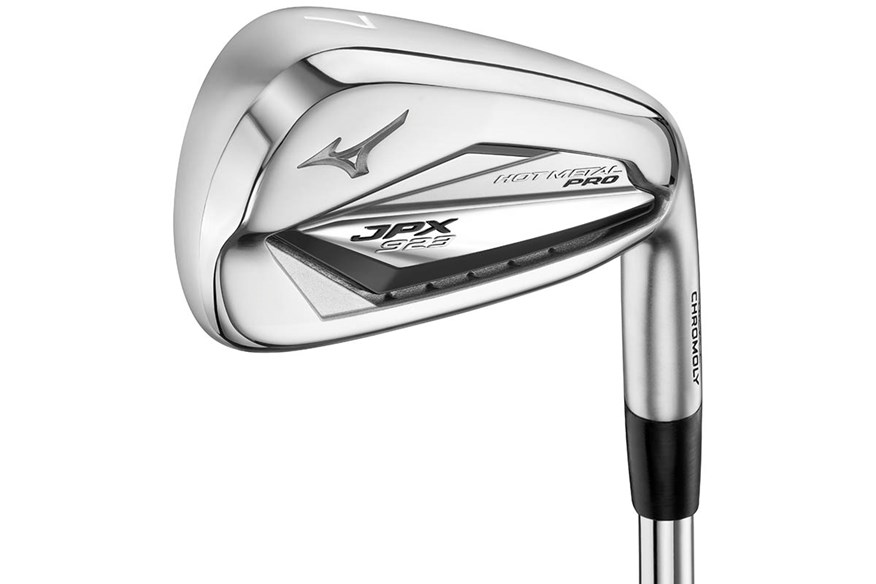

With 124.1mph of ball speed, our 28.5° 7-iron sample delivered the fastest ball speed and longest carry distance (186 yards) of the entire 15 model Players’ Distance Iron test. Just remember though it also has the strongest loft too. All that speed and distance comes with some drawbacks though. At 4881 RPM the Pro produced the least amount of backspin of any iron on test, it also flighted shots lower and landed balls on the green at a shallower angle than our test averages, so make sure you hit shots high enough to get the best out of this model.
From what I’ve seen the more compact and less offset Pro isn’t for everyone, you will need decent levels of speed to launch this model successfully. And when you understand the slightly bigger, wider sole standard game improver JPX923 model launches and flies higher with 867 RPM more spin (for our test pro), while also adding 4 additional yards carry and a steeper landing angle you can see why I’d urge admirers to try both models. If you’re attracted to the Hot Metal Pro and are sensitive to playing the very latest models I’d seriously advise holding off any purchase until we see what’s coming next from Mizuno around August.
Read our full Mizuno JPX923 Hot Metal Pro review.
Pros
- The JPX923 Hot Metal family is a brilliant option for club golfers.
- Choose from a huge array of shaft options with no upcharge.
- The new HL (High Launch) model is a great option for lower-speed players.
Cons
- None of the JPX923 Hot Metal irons are forged.
| Availability | 3-PW |
| Stock shaft | Choose from 21 premium options |
| 7-iron loft | 28.5° |
A great sounding and feeling iron that's a solid performer.
Players' Distance Irons: Best of the Rest
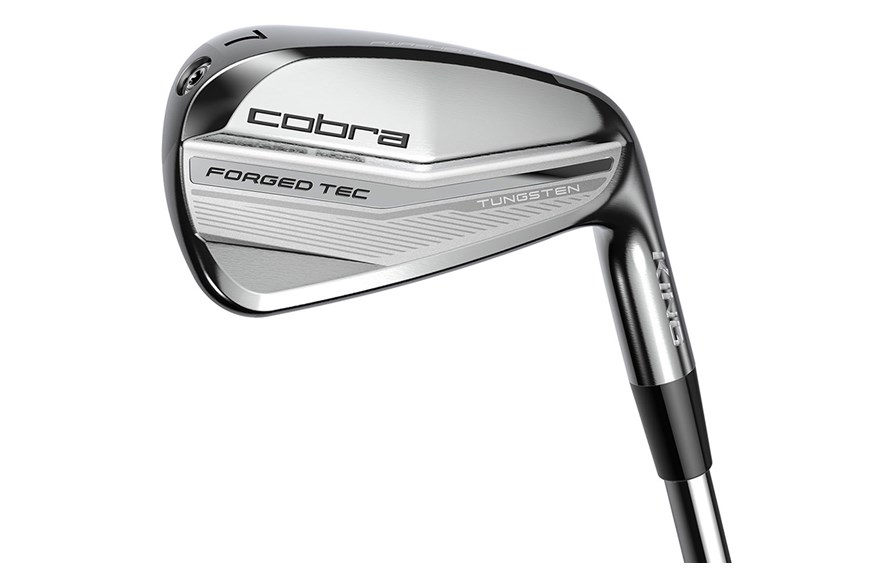

While after testing pretty much every model on the market I feel there are slightly better newer options out there than the Cobra Forged Tec, thanks to having been in the market for some time this is a model you may well be able to pick up for less than the competition in 2025. The Forged Tec has a lovely refined head shape, and thanks to being filled with foam inside it sounds and feels good, while 20g of tungsten helps significantly boost forgiveness. Our test data doesn’t show the Forged Tec ripping up trees, but after having tested the model several times against various competition I’m confident this is a very solid performer that won’t let you down.
Read our full Cobra King Forged Tec irons review.
Pros
- Lovely refined head shape.
- Looks and sounds fantastic.
- Very workable.
Cons
- Not as much stopping power as some.
| Availability | 4-PW |
| Stock shaft | Steel – KBS $-Taper Lite shaft regular (R110) and stiff (S115), 102g; Graphite – Custom fitting only, (KBS TGI 85 stiff/x-stiff and 75 reg) |
| 7-iron loft | 27° |
A top-performing option in both the distance and forgiveness department.
Players' Distance Irons: Best of the Rest


As much as our test pro loved the feel and feedback, and how the Forged produced the smallest carry distance drop-off of the category, while also squeezing shots into a 36.6% smaller dispersion area than our test average, with the model past its 2nd birthday the Forged is just a bit hard to hand on heart fully recommend in 2025. If I were spending my own money I’d really want to know that it’s highly before the years out that there will be a replacement for this desirable model on the scene.
Read our full Mizuno JPX923 Forged irons review.
Pros
- A beautifully made players' distance iron.
- There's an excellent selection of shaft options available with no upcharge
- A fantastic performer across the board.
Cons
- Some purists won't love the slightly stronger lofts from 7-iron - GW.
| Availability | 4-GW |
| Stock shaft | KBS S-Taper Lite |
| 7-iron loft | 30° |
Best Players’ Distance Irons: The Data
Below is the data from our independent testing of the best golf players’ distance irons available in 2024. You can read about all the other models that didn’t make our shortlist above in our golf club review pages or category-specific irons pages.
Test Pro data:
| Iron | 7-Iron Loft | Ball Speed | Launch Angle | Backspin | Height | Descent Angle | Carry Distance | Carry Distance Drop Off | Shot Area |
| Mizuno JPX923 Hot Metal Pro | 28.5° | 124.1 MPH (1) | 14.6° | 4881 RPM | 28 YDS | 41.8° | 186 YDS (1) | 22 YDS | 741.4 SQ YDS |
| Srixon ZX5 MK II | 31° | 122.8 MPH (3) | 15.8° | 5292 RPM | 30 YDS | 44° | 181 YDS (T2) | 18 YDS | 392.4 SQ YDS |
| Callaway Paradym | 29° | 123 MPH (2) | 14.2° | 5120 RPM | 27 YDS | 41.5° | 181 YDS (T2) | 15 YDS | 360 SQ YDS |
| Mizuno JPX923 Forged | 30° | 122.4 MPH | 14.5° | 5117 RPM | 27 YDS | 41.8° | 180 YDS | 7 YDS (1) | 210 SQ YDS |
| PXG 0311 P GEN 6 | 30° | 122.2 MPH | 14.6° | 5520 RPM | 28 YDS | 42.6° | 178 YDS | 10 YDS | 199 SQ YDS |
| Vega Mizar Tour | 30° | 122.3 MPH | 13.5° | 5381 RPM | 26 YDS | 40.8° | 178 YDS | 13 YDS | 360.1 SQ YDS |
| Sub 70 699 Pro | 30° | 121.8 MPH | 14.9° | 5349 RPM | 28 YDS | 42.6° | 178 YDS | 10 YDS | 166 SQ YDS (1) |
| Yonex Ezone CB702 | 31° | 122.6 MPH | 15.6° | 5820 RPM | 30 YDS | 44.4° | 177 YDS | 23 YDS | 533.6 SQ YDS |
| TaylorMade P790 | 30.5° | 121.6 MPH | 15.1° | 5932 RPM | 29 YDS | 43.7° | 175 YDS | 8 YDS (T2) | 180.8 SQ YDS (2) |
| Wilson Dynapower Forged | 30.5° | 120.8 MPH | 13.9° | 5482 RPM | 26 YDS | 41.1° | 175 YDS | 9 YDS | 188.1 SQ YDS (3) |
| Ping i525 | 30.5° | 120 MPH | 15° | 5666 RPM | 28 YDS | 42.7° | 173 YDS | 11 YDS | 217.8 SQ YDS |
| Titleist T200 | 30.5° | 119.7 MPH | 15.4° | 5760 RPM | 28 YDS | 43.3° | 173 YDS | 13 YDS | 331.5 SQ YDS |
| Cobra Forged Tec | 29.5° | 119.4 MPH | 14.7° | 5558 RPM | 27 YDS | 41.9° | 173 YDS | 20 YDS | 612 SQ YDS |
| Mizuno Pro 245 | 30° | 119.3 MPH | 16.1° | 5481 RPM | 29 YDS | 43.6° | 173 YDS | 14 YDS | 271.6 SQ YDS |
| Takomo 101 T | 32° | 116.7 MPH | 16° | 6383 RPM | 28 YDS | 43.9° | 165 YDS | 8 YDS (T2) | 203.2 SQ YDS |
| Average | 121.2 MPH | 14.9° | 5516.1 RPM | 27.9 YDS | 42.6° | 176.4 YDS | 13.4 YDS | 331.2 SQ YDS |
How we tested the best players’ distance irons
We asked the leading brands to send us their 2024 players’ distance irons in our test Pro Neil Wain’s specs.
We created an indoor test lab at Keele Golf Centre to ensure a controlled environment, which meant we could use premium Titleist Pro V1x golf balls and a Foresight GC Quad launch monitor to create the most reliable data possible. We rejected major misses but recorded how shots launched, span, peaked out, and how far they flew in which direction.
See more about how TG tests golf clubs and other equipment.
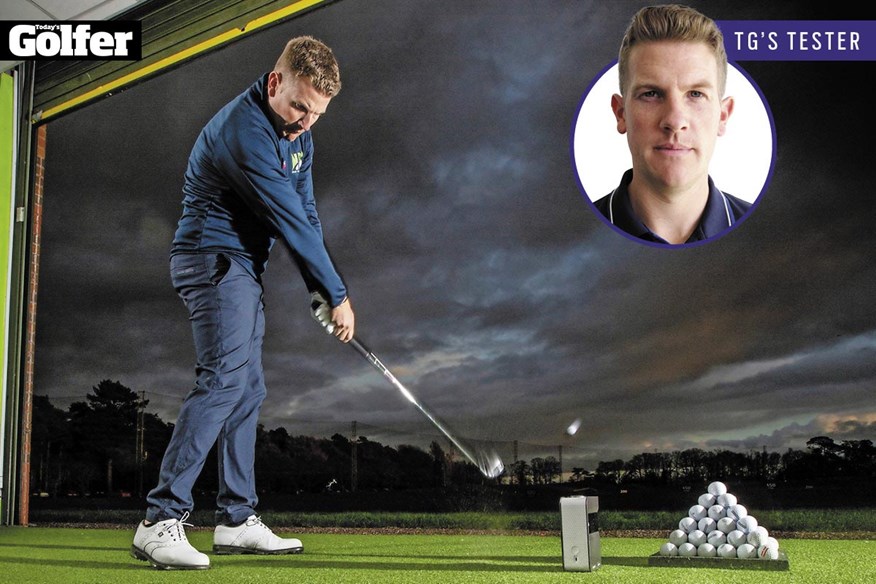
SUBSCRIBE TO TODAY’S GOLFER: Print and Digital access, discounts and rewards!
